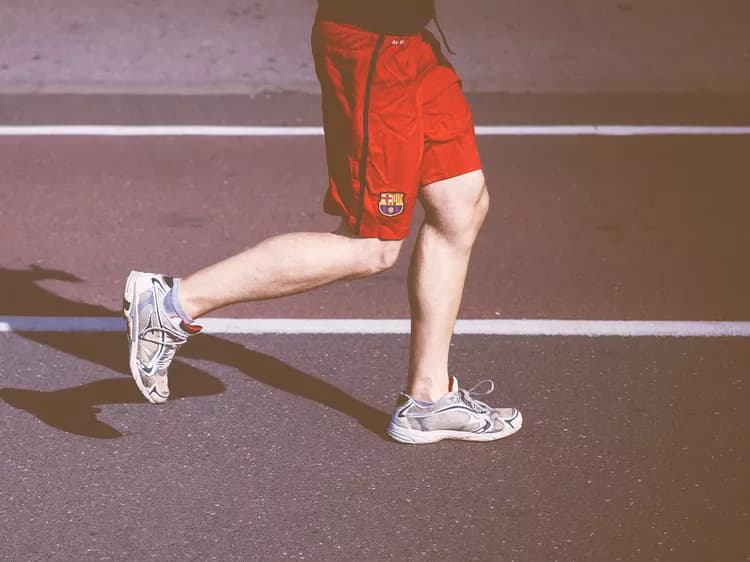
Treadmill Running With Heavier Shoes Tied To Slower Race Times
It makes sense that running with heavier shoes on will cause you to exert more energy than running with lighter shoes. That was proven several decades ago.
But does using more energy while running with heavier shoes translate into slower running times? That's also a yes, say University of Colorado Boulder researchers from the Department of Integrative Physiology, who designed a clever study to show that running times slow when running shoe weight is increased, even if only by a few ounces.
For the study, the researchers brought 18 runners into CU Boulder's Locomotion Laboratory, directed by Professor Rodger Kram, a study co-author. To measure running economy, each participant ran on a treadmill using three pairs of nearly identical shoes, with subtle differences.
Unbeknownst to the runners, the researchers added small lead pellets inside the tongues of two of the three pairs of shoes to be used by each runner. While one pair was normal, each shoe of another pair was made 100 grams heavier and a third pair was loaded with 300 grams of lead pellets per shoe. For comparison, an apple or deck of cards is about 100 grams, or 3.5 ounces.
Each of the runners -- all sub-20-minute 5K performers -- ran treadmill tests in which oxygen consumption and carbon dioxide production were measured with all three differently-weighted shoe pairs. The treadmill tests compared well with previous treadmill evaluations, showing energy costs of the runners rose by about 1 percent with each extra 100 grams of shoe weight.
Later, the runners ran 3,000-meter (about 2-mile) time trials on a CU Boulder indoor track in each of the three shoe pairs once a week for three weeks. Unaware of the differences in shoe weight (the researchers insisted on putting on and taking off the shoes for the test subjects), the runners ran roughly 1 percent slower for each 100 grams of lead added to the shoes in the 3,000-meter race.
"For me, both as a runner and as a scientist, the most interesting part of this study is that our data show that changes we can reliably measure in the lab translate to similar changes in running performance," said CU Boulder postdoctoral researcher Wouter Hoogkamer, who led the study.
"Our results indicate that to evaluate the effects of equipment or technique changes, athletes don't need to run several races at maximum intensity -- we can predict performance based on just a few five-minute bouts of less-than-maximum running effort in the lab on a treadmill," Hoogkamer said.
A paper on the subject was published online in the journal Medicine & Science in Sports & Exercise, the flagship journal of the American College of Sports Medicine. Other co-authors include CU Boulder graduate student Shalaya Kipp (a former CU Boulder All-American and Olympian in the steeplechase) and Barry Spiering of the Nike Sport Research Lab. Nike Inc. funded the study, and Kram is a paid consultant for Nike.
"In exercise physiology class, I learned the classic theory that oxygen delivery determines endurance performance," said Kipp. "It's cool to be able to show that the theory actually holds true in the lab and on the track."
One interesting implication, said the researchers, is that elite marathon runners wearing shoes 100 grams lighter than normal could potentially run about 57 seconds faster. The current men's world record is 2:02:57, set by Dennis Kimetto of Kenya in 2014 while wearing shoes that weighed about 230 grams -- just over eight ounces.
However, when shoe mass is reduced, by compromising cushioning for example, it doesn't mean you will run faster, said Hoogkamer. Prior studies in Kram's lab have shown that proper cushioning also reduces the energetic cost of running. So when selecting footwear, be aware of this trade-off between shoe mass and cushioning.
"Lighter is not always better," said Hoogkamer.
Materials provided by University of Colorado at Boulder. Note: Content may be edited for style and length.
Disclaimer: DoveMed is not responsible for the adapted accuracy of news releases posted to DoveMed by contributing universities and institutions.
Primary Resource:
Hoogkamer, W., Kipp, S., Spiering, B. A., & Kram, R. (2016). Altered Running Economy Directly Translates to Altered Distance-Running Performance. Medicine and science in sports and exercise, 48(11), 2175.
Related Articles
Test Your Knowledge
Asked by users
Related Centers
Related Specialties
Related Physicians
Related Procedures
Related Resources
Join DoveHubs
and connect with fellow professionals

0 Comments
Please log in to post a comment.